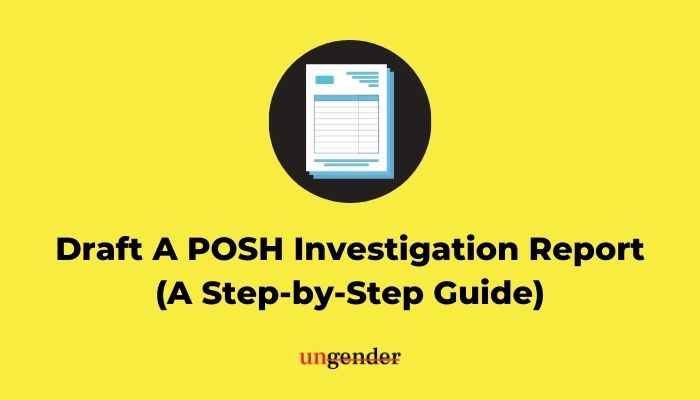POSH 101: How To Prepare A POSH Investigation Report

Written by: Vanita Bhatnagar
Preparing an inquiry report is one of the most arduous tasks for any POSH practitioner. Starting from what goes into the title page to how detailed the report needs to be, if the complaint needs to be reproduced in the report to how the recommendations should be written there and over 1000 questions that come to one’s mind while drafting an inquiry report.
The Internal Complaints Committee (ICC) of an organisation is required to handle a complaint in accordance with the inquiry procedure as provided under the Sexual Harassment of Women at Workplace (Prevention, Prohibition & Redressal) Act, 2013 (POSH).
Why Is Drafting The Report Important?
There is a legal mandate on the ICC to prepare the inquiry report within 10 days from the date of closing the investigation (Section 14 of the POSH Act). Your inquiry report reflects on you and your investigation. So make it as clear, comprehensive, accurate, and proficient as possible.
Therefore, we suggest that you must capture all the details pertaining to the inquiry with laser precision including dates, parties involved, charge memo, the written complaint, defense statement of the respondent, the evidence presented and examined, minutes of the meeting of all investigation proceedings, witnesses’ statements, findings on each charge, supported by reasons and followed by recommendations.
While writing the report use active voice and unambiguous language to state the specific reasons for deciding in the favour of the complainant or otherwise. This inquiry report is the final conclusive document after the investigation is completed with explicit recommendations for further action on the subject-issue.
Before we delve into various aspects of an inquiry report, here are a few things that you should keep in mind before preparing the report:
- Bring on record, all documents submitted by both parties to substantiate their respective claims.
- Put on record the oral testimony of the complainant, respondent, and witnesses.
- Analyse the evidence on record and its impact on the conclusion.
- Try to get a hand on the timeline of events as clearly as possible.
- Analyse how the conduct of the respondent is impacting the culture of the organisation.
Here is a basic format containing the important aspects of the inquiry report:
1. Title Page
The title page is the identity of the document and it must contain:
– The name of the parties
– Designation of the parties
– Their reporting managers
– Their tenure in the organisation
– Case number and other reference number, if any
– The name and the designation of ICC members
– Date of receipt of complaint because the whole process is time-bound
– Date of submission of inquiry report
2. Statement Of Both The Parties And Witnesses
The information provided by both the parties and witnesses should be included in detail. It should mention the nature of allegations, the basic contents of the complaint, how the complaint falls within the purview of POSH, how the complaint was received by the ICC, the details of everyone contacted by the complainant with respect to this case before or after approaching ICC, contents of the response of the respondent and details of any employee of the organization who is aware about the case or the proceedings.
3. Summary Of All The Meetings
As a part of the investigation process, the ICC is required to document each and every meeting that is held with the parties, witnesses and internally within the committee for that particular case. The inquiry report should include a brief about all the meetings that are conducted during the investigation.
4. Charges And Issues For Determination Or Charge Memo
Now the decision is to be taken on the charges in-seriatim. Each charge should be mentioned categorically with statements thereto, discussion on evidence with reference to that particular charge and findings of ICC with reasons specified need to be included in the inquiry report.
5. Reasons
The more important aspect of the report is reasoning. The reason for admitting or dismissing the charge or allegation based on the evidence needs to be put up in clear words. In the landmark judgement of Manjeet Singh vs. Indrapastha Gas Limited, in the High Court of Delhi, W.P.(C) 6352/2016), stated that though the principles of natural justice have many shades, one of its basic tenets is that one must pass a reasoned order i.e. the order must have a valid basis which needs to be incorporated in the inquiry report.
6. Conclusion And/Or Recommendations
This is the operative part of the inquiry report. It shall conclude whether sexual harassment happened or not. It shall mention the disciplinary action to be taken against the respondent depending upon the gravity of the offence. The ICC is required to recommend disciplinary actions against the respondent in terms of applicable service rules.
Most likely, the ICC will come to either of the following possible conclusions:
Scenario 1: Charges are proved against the respondent and the complaint has merit. In this case, the ICC has to conclude its report with findings and recommended action to be taken against the respondent.
Scenario 2: Charges are not proved. In this case, the inquiry can be concluded with a report that no further action is required under the case.
Scenario 3: Charges are not proved and it is discovered that the complaint is malicious.
Under Scenario 1,
while recommending actions the ICC should have reasons for each of the actions recommended. Following pointers should be kept in mind while writing a recommendation –
– The gravity of the misconduct,
– the employees prior work history,
– the stature and designation of the employee,
– the mitigating circumstances,
– the impact of recommended action on employee & company both,
– power dynamics, and
– the cost of such an action.
The actions recommended may vary from a warning, censure to termination of the employee. Recommendations can also include the monetary compensation to be paid to the complainant after deducting the payables of the Respondent.
Penalties/Punishments
Further, the POSH Act prescribes the following punishments that may be imposed by an employer on an employee:
i. punishment prescribed under the service rules of the organization;
ii. if the organization does not have service rules, disciplinary action including a written apology, warning, reprimand, censure, withholding of promotion, withholding of pay rise or increments, terminating the respondent from service, undergoing a counselling session, or carrying out community service; and
iii. deduction of compensation payable to the aggrieved woman from the wages of the respondent.
In the event that the respondent fails to pay the aforesaid sum, ICC may forward the order for recovery of the sum as an arrear of land revenue to the concerned District Officer.
Another important aspect while writing a recommendation is to determine the compensation payable. While recommending the compensation payable to the complainant, ICC should consider the following-
– Mental trauma, distress, pain, and suffering caused to the Respondent.
– The loss in career opportunity due to the incident of sexual harassment;
– The medical expenses incurred by the complainant for physical or psychiatric treatment.
– The income and the status of the respondent
– The feasibility of such payments in lump sum or installments.
Under Scenario 3,
The ICC can recommend a suitable action to be taken against the complainant. This is done in order to ensure that the protection envisaged under the POSH Act is not misused. As per the POSH Act, if the ICC concludes that the allegation made by the complainant is false or malicious or the complaint has been made knowing it to be untrue or forged or misleading information has been provided during the inquiry, disciplinary action in accordance with the service rules of the organization can be taken against such complainant.
7. Signatures
The chairperson and each member of the ICC who participated in the investigation must sign the investigationreport. At the end report, the names of Chairperson and members should be written down clearly with their respective signatures.
Submission Of The Investigation Report
According to the provisions of the POSH Act, you must submit the detailed inquiry report, duly signed, to the management within 10 days from the date of completing the inquiry. The ICC should serve copies of the report to both parties and provide a reasonable time for filing representations, if any. Once the report is submitted to management with appropriate recommendations, the ICC’s role regarding the particular case ends. The management is then responsible for taking further action.
About the author: Vanita Bhatnagar is a lawyer and works as a content curator for Ungender Legal Advisory.
Ungender Insights is the product of our learning from advisory work at Ungender. Our team specializes in advising workplaces on workplace diversity and inclusion. Write to us at contact@ungender.in to understand how we can partner with your organization to build a more inclusive workplace.
Read our insights about diversity, legal updates and industry knowledge on workplace inclusion at Ungender Insights. Visit our Blog.
Sign up to stay up-to-date with our free e-mail newsletter.
The above insights are a product of our learning from our advisory work at Ungender. Our Team specialises in advising workplaces on gender centric laws.
or email us at contact@ungender.in




